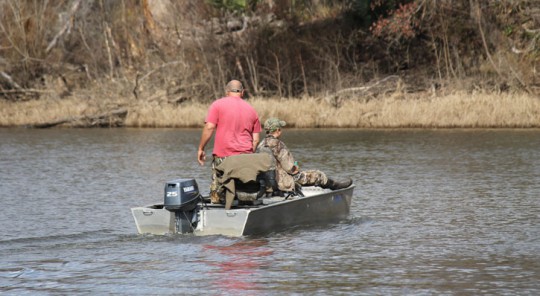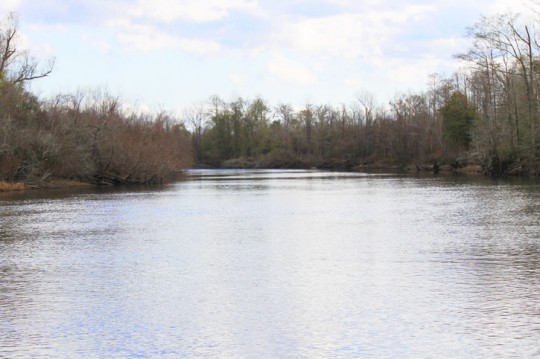Could You Be Trespassing At Your Favorite River Fishing Spot?
January 19, 2012
It’s a murky line between really good fishing, and trespassing.
A measure moving in the House seeks to clarify just where that line is – more specifically, where the state’s waterways end and where abutting private property starts.
The issue is vital to those who own property that runs right up to a riverbank or lake shoreline – how much property they pay taxes on for example is a question depending on where their property stops. But it’s also highly important to boaters, hunters and fishermen who fear losing access to swamps – prime habitat for many of the things they’re looking for.
Sometimes those non-tidal swamps aren’t there in the dry season, but are in the wet – and whether the high water mark or the low water mark or something in between is used as the demarcation point has become a highly contested issue, and the subject of a bill that cleared a committee stop Tuesday, but only after conflicting testimony about what the change would do.
The measure (HB 1103), approved Tuesday by the House Agriculture Subcommittee on a 9-4 vote, seeks to set out the “ordinary high water mark,” which is where the federal government says the public’s sovereignty ends. The trouble is, the state law doesn’t define ordinary high water mark or spell out exactly how you determine where that is.
There have been a couple of court cases that tried to set that definition out – and backers of the bill say it tracks those court opinions. The measure says the ordinary high water mark is the “highest reach of a navigable, nontidal water body as it usually exists when in its ordinary condition and is not the highest reach of such water body during the high water season or in times of freshets.”
 The bill also acknowledges that the ordinary high water mark is a moving boundary and spells out that officials must determine where it is based on a mark on the soil – a change in the soil from where it is usually wet to where it usually is dry.
The bill also acknowledges that the ordinary high water mark is a moving boundary and spells out that officials must determine where it is based on a mark on the soil – a change in the soil from where it is usually wet to where it usually is dry.
As one might imagine, just what it will mean still isn’t agreed on.
Preston Robertson, of the Florida Wildlife Federation, says the new definition will allow the line to be marked lower – allowing more land to be considered private, rather than part of the publicly-owned waterway.
The measure would take “tens of thousands of acres that everybody now enjoys and put it in the hands of private land owners,” Robertson said. And there would be no public benefit for making the change – the benefit would go entirely to those private property owners.
Legislative staff acknowledges that the ordinary high water mark won’t be the highest water level. It doesn’t take in “swamp or overflowed lands,” according to the Agriculture Subcommittee’s staff analysis. “And the ordinary high-water mark is to be found between such lands and the area occupied by the water for the greater portion of each average year,” the analysis says. Also, if there’s water there much of the time, there generally won’t be ability to grow crops – if crops can grow in the soil, it’s beyond the ordinary high water mark, the staff analysis reasons.
The exact line is extremely important to land owners for several reasons, said Jim Handley, executive vice president of the Florida Cattlemen’s Association. “You can’t use property as collateral,” if you don’t know if you own it, he told the committee this week. “It’s a concern of ours if somebody is trespassing and gets injured, who is liable?”
He rejected an assertion by hunters and fishermen, that agricultural landowners are simply trying to increase their holdings.
“This is not a land grab, this is an opportunity to show a clear definition of what folks have been paying property taxes on,” Handley said. “…Nobody’s trying to move the line, they’re trying to define the line.”
Trespassing is a major concern of boaters and sportsmen’s groups – which have for several days been sending around mass emails to draw attention to the issue.
Hunters carrying rifles, or even boaters simply legally carrying a concealed weapon, may be charged with trespassing for fishing on low water they’ve fished on for years.
“If they have to worry about a line that’s now moving, they’re subject to a third degree felony with armed trespass,” Robertson said.
Pictured: The Escambia River near Molino. NorthEscambia.com photos, click to enlarge.
By The News Service of Florida
Comments
7 Responses to “Could You Be Trespassing At Your Favorite River Fishing Spot?”




If you can float it then fish it. Dont be out of your boat on someones property. The army corps of eng. Has jurisdiction over any flowing waters anyway, what I always thought. Now if this is changed there will be land owners trying to utilize all the streams and ponds to farm with. Our water table is drying up as it is. Every lake in central fl has dropped at least 8ft and has stayed there. Every orange grower has a huge pump drawing the lakes down to water their trees. It is sad to see all the dried up lakes and sink holes. We are ruining our water system
How would you feel if you your wife and kid was fishing in a local lake that got full access year around from the river and the land owner walks to the edge of the lake holding a shotgun cussing you your family telling you to get off land or hunting club submerged barbwire under water so it get rapped around your outboard motor. Not only does fishermen need to use common sense (most do) the landowners need to realize the waterway is for public use. I’m glad I fish in Alabama.
may be I do not under stand this, but. when you buy land, you are given, property lines. why not survey the land, and mark it?No one has the right to trespass. I do understand that mistakes can be made.Place a high water marker at the waters edge. Now it seems to me that it should be up to the land owner to mark his or her ground. I would if I lived there.Common sense would seem to go a long way in this area. I mean, if it is high water, do you really need to be fishing in some one’s back yard?And no you should not be fishing near some one’s tool shed if it is flooded.
If you want to read up on this, go to Rivers and Public Trust. I read on one of these sites that the federal government declared at the end of the Lewis and Clark expedition tnat all running streams were to be held in trust by the federal government for the public. No one can own them. It is just access that you have a problem with. It stated that if you have access on one site that as long as you can travel that stream without having to leave your boat, it’s legal.
I understand the concerns of the landowners along the rivers, etc. ,BUT I always thought it was pretty stupid for a ‘trespasser’ to be able to sue someone because they were hurt in someway while trespassing. DUH! It’s been that way for many years. It’s waaay past time for people to take responcibility for their own actions and if they are ‘trespassing’ when they get hurt…oh well! I knew of a man who owned property with a gravel lake on it. He had a fence around it, with no trespassing signs. Some kids climbed the fence, went swimming and one drowned. He was sued and they won the case. Excuse me! I think the parents/guardians should have been held responcible for not tending to and keeping up with their children. The laws are DUMB that allows rewarding parents for neglecting their duties as parents. Also, dumb laws that allow trespassers to sue the people they trespass against. It all can be summed up…
BE RESPONCIBLE for yourself and your family and STOP blaming everyone else for your mistakes. just saying~
In my opinion, if a person can reach an area in a boat without having to get out of the boat, then this is public land. Hopefully law enforcement will use common sense in inforceing any laws passed.
Maybe good reasonable common sense enforcement would help, too.
Please don’t use the federal rules; create your own that allow for protection of the property owner.